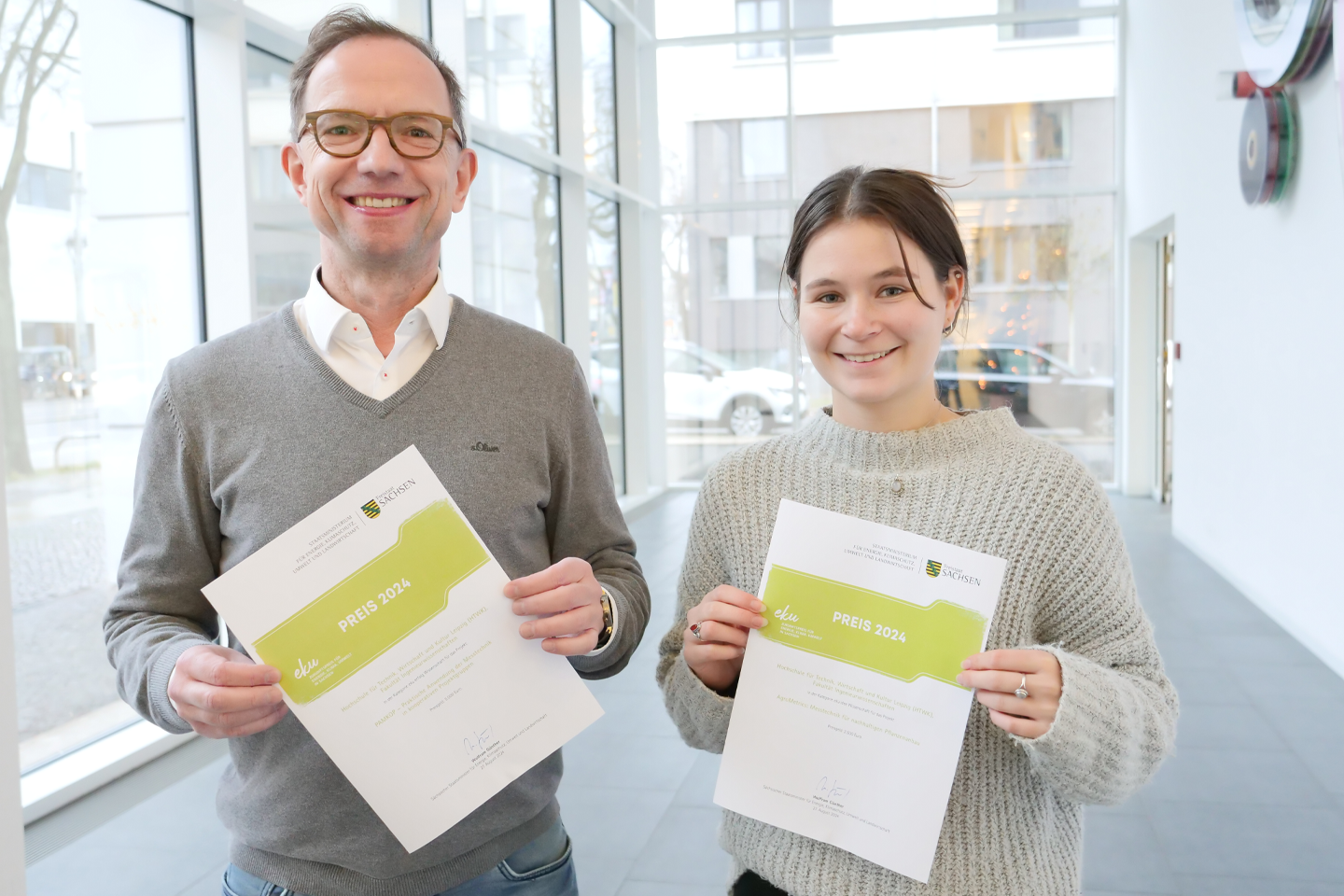Engineering project ideas for sustainability and education receive eku Future Prize 2024
In December 2024, two teams from the Faculty of Engineering received the Saxon "eku - FUTURE PRIZE 2024" for their successfully completed project "PAMKOP - Practical Application of Measurement Technology in Cooperative Project Groups" and the project idea "AgroMetrics - Measurement Technology for Sustainable Crop Cultivation" .
Every year, the Saxon State Ministry for Energy, Climate Protection, Environment and Agriculture (SMEKUL) honours projects that make an exemplary contribution to ecologically sustainable development in Saxony and to the protection of the climate, resources, nature and the environment with the "eku - Zukunftspreis für Energie, Klima, Umwelt 2024". The initiative also aims to support the diverse commitment in the Free State, make it visible and promote communication with and between the stakeholders.
In the "Science" category this year, Prof Mathias Rudolph 's team (Chair of Industrial Metrology, Faculty ING HTWK Leipzig) was delighted to receive prize money for the "PAMKOP" project.

PAMKOP | Practical application of measurement technology in co-operative project groups
The basic concept of the project consisted of expanding the previous forms of teaching to include project work during the semester, in which a group of students worked together with pupils on problems relating to real technical systems and plants.
In two runs (SS23, WS23/24), the project groups dealt with topics relating to agrivoltaics, NIR diagnostics, mobile charging using photovoltaics and hydroponics. Agri-photovoltaics describes the joint use of land for agricultural plant production and PV electricity production. Within this topic, the participants learnt how measurement technology can have supporting functions as a component of agri-photovoltaics, for example by measuring plant health. By using an NIR camera, the participants were able to detect defects in solar cells. In the field of mobile charging, charging curves of batteries of an e-scooter and e-bike were recorded by charging via mains power and a solar folding module. Other project groups focussed more closely on estimating the yield of the solar folding module at different locations and theft protection using a GPS sensor. Hydroponics is a form of plant cultivation that works without soil by supplying the plants with a water-nutrient solution via their roots. Within this topic, the participants were familiarised with the construction and operation of hydroponic systems. The focus was on the measurement and automation systems used, which serve to increase efficiency and control in plant cultivation.
The first round of the programme was conducted exclusively with students. The results of the evaluation of this first run were used to improve the tasks and practical test stands for the second run, in which pupils took part alongside the students.
The main aim of the project was to increase the practical relevance of the teaching, both for the students and for the pupils. In the second evaluation, 84% of students were in favour of increasing the practical relevance compared to conventional internships. Among the pupils, 50% reported an increase in the practical relevance compared to conventional school events. Other objectives were to promote interest in STEM courses (among pupils), to increase intrinsic motivation by taking on an active role, to make knowledge transfer more sustainable and to improve teamwork and organisational skills. The achievement of these goals was also measured on the basis of the evaluation. The results were largely positive, although there is definitely room for improvement.
At the end of the project, it was clear that the development of a new learning format takes time and cannot be optimised within two runs. Working on new learning formats is therefore time-consuming, but worthwhile.
The project idea "AgroMetrics", which was formed from Prof Rudolph's team, was also awarded a prize in the "Science" category.
AgroMetrics | Measurement technology for sustainable plant cultivation"
The aim of the project is to develop and implement a test rig that enables the interaction between organic photovoltaics (OPV) and plant growth to be analysed in detail. Specifically, the focus is on analysing the effects of darkening by semi-transparent OPV modules on the roof of a greenhouse on plant growth and the climate inside the greenhouse, as well as on determining the electricity yield. By analysing plant and electricity yields together, the potential of OPV technologies for use in ornamental and crop cultivation is to be determined.
The test stand will be set up on the premises of the Leipzig Vocational Training Centre (BBW). This will allow the HTWK to benefit from the expertise of the plant growers. On the other hand, the sub-goal is to familiarise the BBW trainees with the measurement technology and its support potential in a practical way.
Specifically, the experimental setup will comprise three test stands, all within miniaturised greenhouses. OPV cells will be installed in the roof above two of the three test stands. The third test stand will remain unshaded and serve as a reference. The OPV module of test stand one charges a battery during the day, which powers a UV LED after sunset. This artificially extends the growth time. All test stands are to be equipped with technology for recording measured values such as brightness, temperature, humidity, etc.